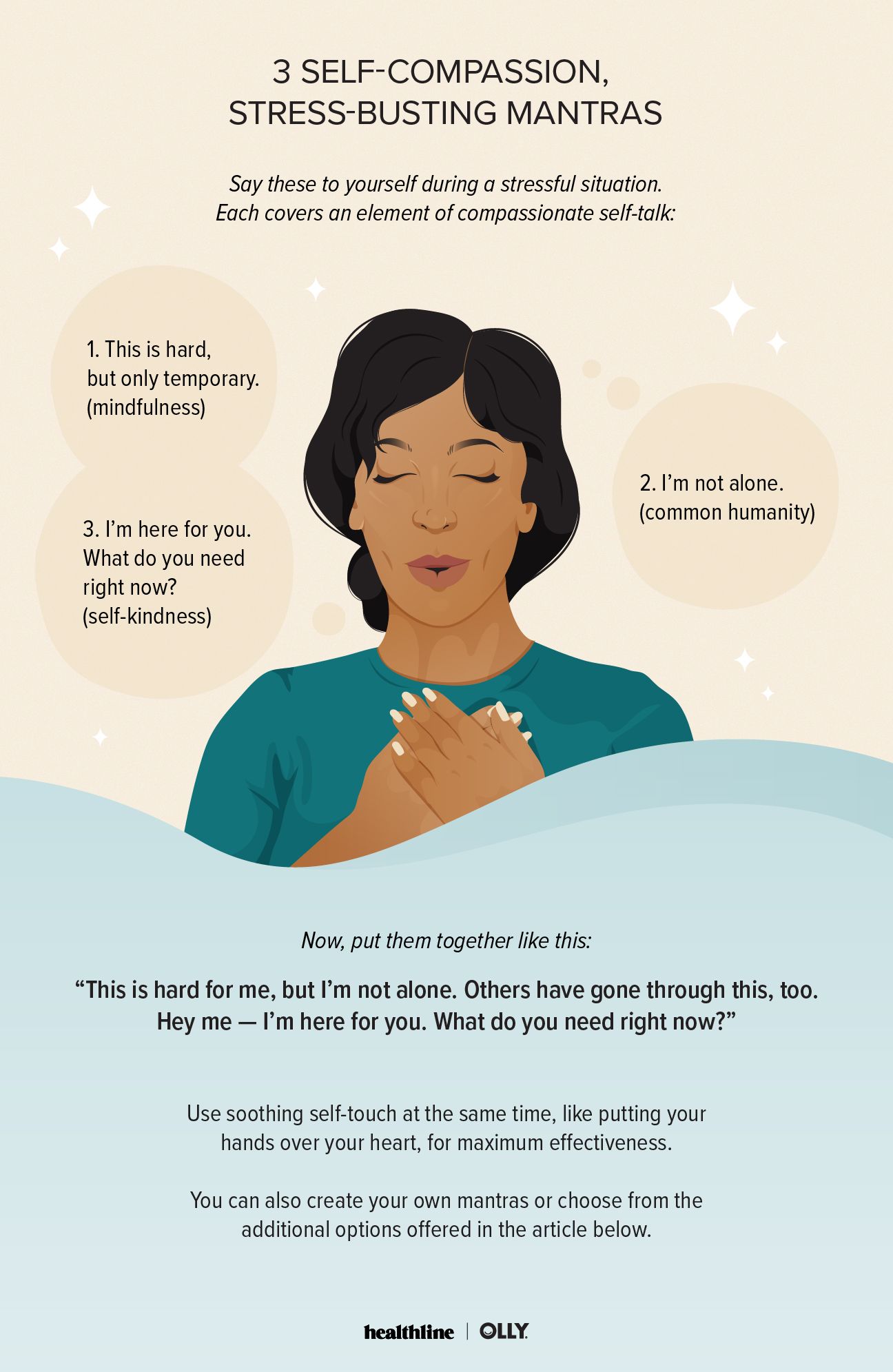The way you speak to yourself during and after stressful situations can make the difference between spiraling into an overwhelming state of panic or finding calm and the strength to move on.

In recent years, researchers have found that self-compassion plays a critical role in stress coping.
People who have higher self-compassion tend to use adaptive, healthy coping mechanisms in times of stress, while people who have lower levels of self-compassion are more likely to use harmful stress coping mechanisms, according to one 2021 review.
And self-compassion is powerful, regardless of your age or gender.
“[Self-compassion is] one of the most powerful sources of coping and resilience we have available to us,” explained Kristin Neff, PhD, associate professor of educational psychology at the University of Texas at Austin and author of “Self-Compassion.”
“It’s always there in our back pocket. We just forget about it.”
Luckily, you can work on being more self-compassionate. It just takes practice.
We’ve partnered with Olly® to bring you these three self-compassion mantras (short, repeatable phrases) you can tell yourself in stressful moments.
Start with soothing self-touch
When you’re stressed, it can help to soothe yourself with touch, said Neff.
“Put your hands on your body in a way that feels good,” Neff recommended. “Maybe your face, maybe give yourself a hug, maybe you can hold your hand, maybe put your hands on your heart.”
Soothing yourself with touch and receiving hugs may help reduce stress hormone levels and stimulate the vagus nerve and the release of the feel-good hormone oxytocin — which calms us down and helps us feel better in times of stress.

Experts define self-compassion as the ability to soothe yourself with nonjudgemental kindness when you’re stressed or suffering.
People who have more self-compassion tend to have greater well-being and fewer mental health challenges like anxiety, depression, and stress.
It’s like a muscle — you can strengthen it with practice, and it can become an instinctual reaction you have to face difficult events, said Neff.
According to Neff, self-compassion has three essential elements: mindfulness, common humanity, and self-kindness. At the same time, it steers you away from feeling isolated, judging yourself, and over-identifying with your stress or becoming overwhelmed by it.
“All these factors come together to really powerfully alter our mind state in the midst of stress,” explained Neff. “And then once we have a more supportive, connected, warm, more mindful mind state, then the stress is less overwhelming.”
1. Mindfulness
Neff described mindfulness as the ability to be aware of what’s happening without ignoring it or being monopolized by it.
“If you ignore your stress, that’s a problem. It gets stored in your body. But if we get freaked out by the stress, we’re totally stressed out, that’s hard as well,” she explained.
Here are some examples of mindfulness-related self-compassion mantras to try:
- This is hard, but only temporary.
- This is a moment of difficulty.
- It’s hard to feel this.
- Stress hurts.
- Stress is difficult.
2. Common humanity
“Most human beings are stressed. It’s part of being human. There’s nothing wrong with you for feeling this way,” said Neff. “Once you kind of realize that this is common, that you’re connected to other people, that you aren’t alone, it actually makes the stress less overwhelming by being less isolating.”
Here are some example self-compassion mantras to help you connect to your common humanity:
- I’m not alone.
- Stress is part of life.
- It’s part of being human.
- I’m not the only one.
- There’s nothing wrong with me for feeling this way.
3. Self-kindness
What would you say to a good friend in the same situation? Now, tell yourself the same thing.
“With self-kindness, we’re actually supporting ourselves. We’re giving ourselves warmth. We’re asking ourselves, ‘What do I need to get through this right now?’”
This emotional self-care is important in so many ways, Neff said. It helps make the stress feel less scary “when you know you have your own back.”
What you need will depend on the situation. Give yourself permission to ask that question, and then to answer it.
Sometimes, what you may need is to be assertive and set boundaries with other people or say no. Other times, it may not be possible to remove the cause of your stress, but giving yourself emotional support can help you feel calmer.
Here are some example self-compassion mantras to experiment with for self-kindness:
- What do I need right now?
- Let me be kind to myself in this moment.
- Let me give myself the compassion I need.
- I’m going to get through this.
- What do I need to be well?
Sleep for self-kindness
Being kind to yourself isn’t just about quieting negative thoughts or setting boundaries. Concrete self-care strategies are also important and can help support your emotional self-kindness efforts. Sleep, for example, is a crucial part of overall health and well-being.
Without proper shut-eye, it can be hard to make space for self-compassion and manage stress. If sleep is eluding you, it may help to take inventory of your typical sleep habits.
Do you have trouble falling asleep? Try getting rid of screens in the bedroom or investing in blackout blinds. Is a snoring partner keeping you awake? Earplugs might do the trick.
Start with a self-soothing touch, like giving yourself a hug or putting your hand over your heart.
Then, Neff recommended using the mantras for each element of self-compassion in sequence:
- First, focus on mindfulness to help you become aware of your stress while remaining separated from it.
- Then, focus on common humanity to help you feel connected to others and less isolated.
- Finally, turn to self-kindness to help soothe and make you feel better.
Speaking to yourself in a compassionate way creates physiological changes in your body that can help you calm down, feel safe, and cope with stress.
You can create your own mantras or choose the ones here that resonate most with you. Make sure to include all three components of self-compassion: mindfulness, common humanity, and self-kindness.
As you repeat your self-compassion mantras to yourself, give yourself a soothing touch to take your body out of fight or flight mode and promote feelings of safety and relaxation.
The more you practice self-compassion, the more easily it will come to you in times of stress, helping you become more resilient.
